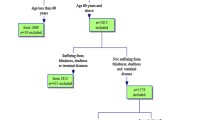Abstract
Objective
To test whether depressive symptoms mediate the effects of activities of daily living (ADLs) on nutritional status of older adults living in long-term care (LTC) facilities in Taiwan.
Design
A cross-sectional study.
Setting
Seventy-three community-based LTC facilities in northern Taiwan.
Participants
This study sampled 306 adults ranging in age from 65 to 97 years who were free of acute infection or disease and who were able to communicate.
Measurements
Nutritional status was assessed by the Mini-Nutritional Assessment (MNA) scale and depressive symptoms were assessed by the short form of the Geriatric Depressive Scale (GDSSF).
Results
MNA scores revealed that 65% of the subjects were at risk for malnutrition (17 to 23.5 points). In addition, depressive symptoms partially mediated the relationship between ADLs and nutritional status, with 10.7% of the effect of depressive symptoms on nutritional status going through the mediator.
Conclusion
Interventions to reduce depressive symptoms among institutionalized older adults should focus on improving nutritional status rather than promoting ADLs, which are believed to be difficult to change.
Similar content being viewed by others
References
Ellis G, Langhorne P (2005) Comprehensive geriatric assessment for older hospital patients. Br Med Bull 71:45–59.
Guigoz Y (2006) The Mini Nutritional Assessment (MNA®) review of the literature-what does it tell us? J Nutr Health Aging 10:466–487.
Smoliner C, Norman K, Wagner KH, Hartig W, Lochs H, Pirlich M (2009) Malnutrition and depression in the institutionalised elderly. Br J Nutr 102:1663–1667.
Chang HT, Liu LF, Chen CK, Hwang SJ, Chen LK, Lu FH (2010) Correlates of institutionalized senior veterans’ quality of life in Taiwan. Health Qual Life Outcomes 8:70.
Nutrition Screening Initiative (2004) Incorporating nutrition screening and intervention into medical practice. Nutrition Screening Initiative, Washington, DC.
Payette H (2005) Nutrition as a determinant of functional autonomy and quality of life in aging: A research program. Can J Physiol Pharmacol 83:1061–1070.
Chen LK, Lin MH, Hwang SJ, Wang P, Chwang LC (2007) Nutritional status and clinical outcomes among institutionalized elderly chinese in taiwan. Arch Gerontol Geriatr 44:315–323.
Johansson Y, Bachrach-Lindstrom M, Carstensen J, Ek AC (2009) Malnutrition in a home living older population: Prevalence, incidence and risk factors. A prospective study. J Clin Nurs 18:1354–1364.
Webber AP, Martin JL, Harker JO, Josephson KR, Rubenstein LZ, Alessi CA (2005) Depression in older patients admitted for postacute nursing home rehabilitation. J Am Geriatr Soc 53:1017–1022.
Cabrera MAS, Mesas AE, Garcia ARL, de Andrade SM (2007) Malnutrition and depression among community-dwelling elderly people. J Am Med Dir Assoc 8:582–584.
German L, Feldblum I, Bilenko N, Castel H, Harman-Boehm I, Shahar DR (2008) Depressive symptoms and risk for malnutrition among hospitalized elderly people. J Nutr Health Aging 12:313–318.
Pfeiffer E (1975) A short portable mental status questionnaire for the assessment of organic brain deficit in elderly patients. J Am Geriatr Soc 23:433–441.
Guigoz Y, Lauque S, Vellas BJ (2002) Identifying the elderly at risk for malnutrition the mini nutritional assessment. Clin Geriatr Med 18:737–757.
Haboubi NY, Hudson PR, Pathy MS (1990) Measurement of height in the elderly. J Am Geriatr Soc 38:1008–1010.
Shah S, Vanclay F, Cooper B (1989) Improving the sensitivity of the barthel index for stroke rehabilitation. J Clin Epidemiol 42:703–709.
Sheikh JA, Yesavage JA (1986) Geriatric Depression Scale (GDS): Recent findings and development of a shorter version. In: Brink TL (ed) Clinical gerontology: A guide to assessment and intervention. Howarth Press, New York, pp 165–173.
Liao YC, Yeh TL, Ko HC, Luo ZM, Lu FH (1995) The short form of geriatric depression scale (GDS-SF)-a preliminary report of reliability and validity for chinese version. The Changhua Journal of Medicine (in Chinese) 1:11–17.
Lee HCB, Chiu HFK, Kowk WY, Leung CM, Kwong PK, Chung DWS (1993) Chinese elderly and the GDS short form: A preliminary study. Clin Gerontol 14:37–42.
Ministry of the Interior (2012) Population by Single Year of Age. Ministry of the Interior, Taipei.
Huang JJ, Lin KC, Li IC (2008) Service needs of residents in community-based long-term care facilities in northern taiwan. J Clin Nurs 17:99–108.
Tsai AC, Lai MC, Chang TL (2012) Mid-arm and calf circumferences (MAC and CC) are better than body mass index (BMI) in predicting health status and mortality risk in institutionalized elderly taiwanese. Arch Gerontol Geriatr 54:443–447.
Hsieh YM, Sung T, Wan KS (2010) A survey of nutrition and health status of solitary and nonsolitaty elders in Taiwan. J Nutr Health Aging 14: 11–14.
Cereda E (2012) Mini nutritional assessment. Curr Opin Clin Nutr Metab Care 15:29–41.
Lin IC, Yu SM, Chang HJ (2004) A survey of depression and its related factors of the institutionalized and non-institutionalized elderly in Hsin-Tien city. Taiwan J Fam Med 14:81–93.
Ruckdeschel K, Thompson R, Datto CJ, Streim JE, Katz IR (2004) Using the minimum data set 2.0 mood disturbance items as a self-report screening instrument for depression in nursing home residents. Am J Geriatr Psychiatry 12:43–49.
Thomas P, Hazif-Thomas C, Clement JP (2003) Influence of antidepressant therapies on weight and appetite in the elderly. J Nutr Health Aging 7:166–171.
Author information
Authors and Affiliations
Corresponding author
Rights and permissions
About this article
Cite this article
Li, Ic., Kuo, H.T. & Lin, Y.C. The mediating effects of depressive symptoms on nutritional status of older adults in long-term care facilities. J Nutr Health Aging 17, 633–636 (2013). https://doi.org/10.1007/s12603-013-0018-7
Received:
Accepted:
Published:
Issue Date:
DOI: https://doi.org/10.1007/s12603-013-0018-7



